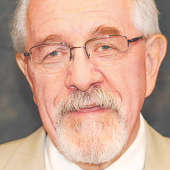- Christmas shopping is done, presents wrapped, strings attached? (12/14/16)
- Cecil is dead and human lives are threatened every day (8/12/15)
- As state flags go, Nebraska's ranks 50th (7/8/15)
- When everything looks like a nail (4/29/15)
- Who remembers to coal slurry pipeline debate? (3/11/15)
- More revelations in Department of Corrections mess (12/17/14)
- Hang on, there's an a election in a couple of weeks (10/22/14)
Opinion
The Legislature becomes more Republican
Wednesday, November 19, 2014
Republicans will outnumber Democrats almost three to one when the Unicameral convenes in January. There will be 18 new faces, 17 of them elected and one appointed by Republican Governor -- Elect Pete Ricketts.
The 104th Legislature, officially a non-partisan body, will have 35 Republicans, 13 Democrats and one Independent. Not that anybody tracks things by party labels -- except for the governor and the lobbyists and the news media and the general public and the parties themselves. But in case you WERE counting, that is a gain of five for the Republicans.
So what difference does it make in a non-partisan Legislature? Theoretically, a Republican governor will have 35 votes on issues that might be seen as Republican. That would include things such as property and income tax relief, two things Ricketts says he champions. Issues typically promoted by Democrats, such as expanded Medicaid and other social causes, will likely not fare so well.
During the administration of Governor Charlie Thone (1979-1983), the large number of Republican senators were known as the "Thone Clones." That was one of the first instances that one party or the other might pool their efforts to support or defeat legislation. Thone lost his seat to a young Vietnam veteran named Bob Kerrey during an era when Republicans and Democrats seemed to regularly alternate taking the governorship.
But Republicans have occupied the executive offices in the northeast corner of the State Capitol building continually since 1999. Political observers and lobbyists oft lamented the fact that 10-year Republican Governor Dave Heineman seemed to have a larger and more consistent group of senators behind him than even the Thone Clones. Whether or not the latest increase will give Ricketts more power remains to be seen.
The shift was expected since eight Democrats were term-limited out of the body. Many of them were leaders and often made things between Heineman and the Legislature a little -- no, make that a lot -- uncomfortable. Case in point, why do you think the state Republican leaders recently called for the resignation of Democrat Senator Steve Lathrop of Omaha who is heading a committee looking into the dysfunction in the Department of Corrections? Lathrop ignored the request and the committee report will be delivered in December and laid at the doorstep of the next Unicameral.
Some say the shift simply mirrors the mood of the nation with Republicans winning control of the U.S. Senate and several key governorships. Democrats and some vocal lobbyists blame it all on term limits, which limits Nebraska lawmakers to two four-year terms.
Proponents of term limits have said that legislative staff will carry the brunt of the constituent load anyway, thus making the senator turnover irrelevant. Opponents have noted that term limits has caused a large amount of turnover in those staffers, the people who answer the phones and read the mail and schedule meetings and offer advice to their bosses. Turnover in that staff has always been an issue every four years, but since term limits went into effect eight years ago, more of those veteran staff are finding jobs elsewhere -- often outside government -- or simply retiring.
There goes the institutional memory. This brain drain leads to a more inexperienced staff saddled with advising inexperienced senators. The old "Blind Leading the Blind" routine. And we know where that situation usually ends up.

